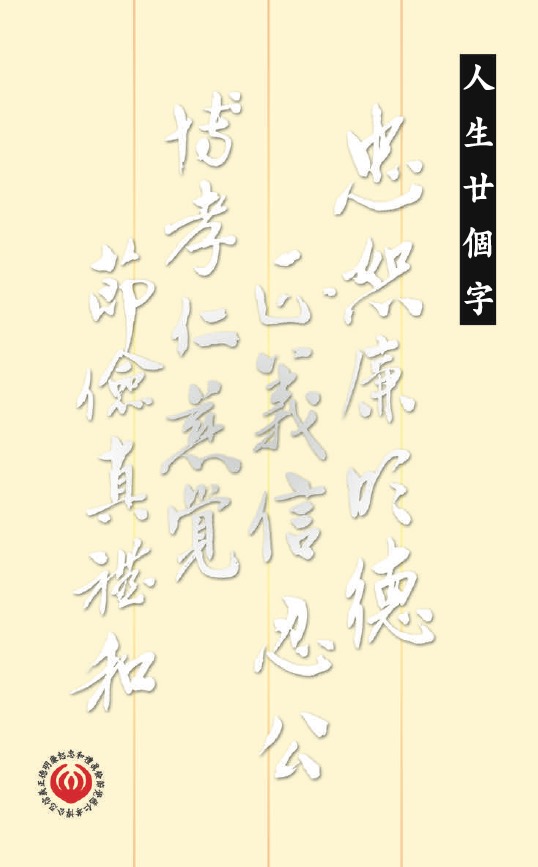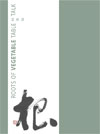忠 –
- 成就了別人,超達了自己。
- 忠於國、忠於家、忠於朋友。
- 在於融和處事,不可以偏激或乏力,才是中正不偏的忠。
- 在衡量事物的重要性時,必然要選擇有比自己還要更重要的本質;
- 在衡量事情的效果性時,必然要選擇有比自己還要更遠大的成果。
Loyalty –
- In helping others achieve their goals, you achieve beyond your own goals.
- Be loyal to your country, family, and friends.
- True loyalty is to harmoniously handle any matter, neither being extreme nor lackadaisical.
- When weighing the importance of matters, one must choose beyond self-importance.
- When evaluating effectiveness, one must choose the farthest-reaching results beyond self-interest.
恕 –
- 鬆弛人與人之間的崩騰,寬平自己的內心世界。
- 是寬恕和原諒,使自己得回寧靜的心。
- 不恕便是懷恨和抱怨,使自己忿忿不開心。
- 恕使人開懷,不恕使人不開心,是無需思考來取捨。
- 不怨天,不尤人,心能寧靜與否,全是自己的責任。
Forgiveness –
- Forgiveness relieves tension among people and pacifies our heart and mind.
- To forgive and to pardon restores our peaceful mind.
- Being unforgiving means holding onto grudges and resentments which actively make yourself unhappy.
- Forgiveness makes people happy and unforgiveness makes people unhappy. The choice is obvious without analysis.
- Do not blame the heavens or others; We are solely responsible for whether our mind can be at peace or not.
廉 –
- 廉宜,以簡單樸實為品味,來減除好勝奢侈的心頭。
- 清廉,以淡然名利為操守,來杜絕貪求多得的欲望。
- 人所以開心,不是在於有,而是活得無著的單純。
- 人的不開心,不是在於無,而是活得執著的繁複。
- 要自豪的,不在擁有,而在自己的言行能否鼓舞別人。
Integrity –
- To live with integrity is to live simply and plainly, so that it can lessen the urge to win and to live extravagantly.
- To live with integrity is to have an incorruptible mind unmoved by fame or self-interest, so that it can deter greedy desire.
- Being happy is not derived from having possessions; it is from living simply without mental attachments to materials.
- Being unhappy is not derived from lacking in possessions; it is from living with the complexity of material attachments.
- Pride comes not from your possessions, but from your ability to inspire others through your good deeds.
明 –
- 首先要知己,因為知人者智,自知者明。
- 知人多昧於看己之失,自知多昧於晦人之過。
- 不要逞強精明,不要憂心別人看自己能成好人的柔遜。
- 知道了道理而加以磨鍊實習,才算真明。
- 酒色財氣能污染品行,能不染就是真正明白。
Insight –
- Know yourself first because, while knowing others requires intelligence, knowing yourself makes one proficient at understanding life.
- Scrutinizing others often hinders self-introspect for our mistake; Knowing yourself often take it lightly to scrutinize on other’s oversight.
- Do not show off your shrewdness and worry not what others may think of your gentle nature, which is what makes you a good human being.
- Knowing and forging such knowledge in life is true understanding.
- Alcohol, lust, avarice and anger can defile one’s behavior. People who can remain unstained have a true understanding of those dangerous habits.
德 –
- 忍讓謙和是內在美德,博施濟眾便是公德。
- 損人利己,不理公益便是缺德。
- 德可以培養出寧靜的心而使人容易感受到快樂。
- 德可以用來善應人與事而使人減少人為的苦惱。
- 以德待人,便是以最高度的人性本質,替面對的帶來非常正面的薰陶。
Ethics –
- Forbearance and humility are the inner ethics; generosity to aid society is the outer ethics.
- Benefiting yourself at the expense of others and ignoring public welfare is unethical.
- Ethics engenders a peaceful mind that easily leads to happiness.
- Ethics can be used to deal with life tactfully to avoid creating distress.
- Treating others ethically is the noblest human quality to positively influence those we encounter.
正 –
- 天下事物正的都好,不正的如彎心曲性、負念邪行等等都會是不好。
- 方正的事物可以取用,方正的人格可以取信。
- 人皆想開心,但忽略了不正情緒的作硬。
- 人皆想做好,但忽略了要正心飭己為先。
- 事與願違,使人不開心。心身與正確思想相違,更是成敗得失的始末 。
Uprightness
- Everything that is upright is proper. What is not upright, such as a crooked mind, a negative thought, or a vicious deed is improper.
- Material that can stand upright is useful; an upright person is trustworthy.
- Everyone wants happiness, but neglects the hardening of their negative emotions.
- Everyone wants to do good, but neglects first having an upright mindset.
- Unfulfilled wishes make one unhappy. The fundamental cause for failure is when one’s actions contradict one’s upright thinking.
義 –
- 以別人為先的道義準則。
- 濟困扶危,不為報酬,只為正義。
- 道義能產生溫情,是生活上強而有力的快樂泉源。
- 家變訴訟大多由於因利失義,因失義而失眾,以至互相仇怨爭持。
- 以體恤別人去寬平不滿,若世間少一分不滿,人生便多一分圓滿。
Righteousness –
- The moral principle of righteousness is to put others first.
- Unconditional to help others’ predicament is the most righteous act.
- Righteousness fosters good rapport with people and is a powerful source of happiness.
- Most of the family turmoil and litigation are instigated through self-interest superseding righteousness. Unrighteousness breaks people apart and so is the root cause of strife.
- Compassion eases others’ dissatisfaction. Our lives become more fulfilled as dissatisfaction lessen in the world.
信 –
- 人無信不立,社會國家無信必成紊亂。
- 失敗乃成功之母。不要害怕失敗,便是自信的開始。
- 不要瞎信,要看信實,便是處事的誠信。
- 堅守承諾,言出必行,便能取信於人而事事亨通。
- 若然失信,任何事情便成有始無終。
Trust –
- An untrustworthy person cannot succeed. A distrustful society or country becomes chaotic.
- Failure is the mother of success. Fearlessness of failure engenders self-trust.
- Don’t blindly trust. Seeking reliable evidence is the most trustworthy action in dealing with any matter.
- Honoring promises with actions earns trust from others and leads to a prosperous life.
- Without self-trust or trust from others, nothing can be achieved.
忍 –
- 忍是用來按耐內心的衝動情緒。
- 能按著惡性的衝動便是忍耐,能按著善性的衝動便是忍心。
- 忍是以柔勝剛,以退為進的穩重氣魄。
- 不忍便是囂張浮躁,魯莽輕率的意氣。
- 不是一生一世甚麼都要忍,而是忍著小如當下倏忽拂意的一點。
Forbearance –
- Forbearance is self-restraint over impulsive emotions.
- To restrain vicious impulsive emotions is forbearance; to restrain kind impulsive emotions is indifference.
- Forbearance is steadfast courage where soft overcomes hard and advancing by retreating.
- Not to forbear is to be arrogant, impetuous, reckless, and imprudent.
- It is not that we must forbear all our lives, but in each tiny moment of upset.
公 –
- 秉公辦事,不自私自利,以大眾利益為本。
- 若人人只顧私益,撫卹社會的公益便無人問津。
- 若人人只顧私德,維護社會的公德便無人修習。
- 不要時常盤算私下的時間、精神和體力是比較別人的還要寶貴可珍。
- 以大公無私的心,容下外在的世界,便能減少與別人的距離和紛爭。
Impartiality –
- Dealing with worldly matters impartially means being unswayed by self-interest, and guided by public interest.
- If everyone only cares about their self-interest, no one will be concerned about the welfare of society.
- If everyone only cares about their own ethics, no one will practice morality for the public good.
- Don’t meticulously measure your time, energy and strength as more precious than that of others’.
- With immense impartiality and a selfless heart to embrace the world, distance and contention with others will be diminished.
博 –
- 要博大如山,汪涵如海,便要能接受。
- 慈善社會時能給與任何物類,便是博施濟眾。
- 應對人生時能接受任何事情,便是胸襟溥博。
- 不能接受,便會抗拒,抗拒愈猛烈,陝隘和煩惱亦會相繼益增。
- 接受不是懦弱被動,是給與思維空間去斟酌,而不接受便會有魯莽繃騰的反應。
Broadness –
- To be as broad as a mountain or as vast as the sea, we must accept whatever comes to us.
- Giving help to the needy without any differentiation is a broad range of charity.
- Accepting worldly matters without distinguishing between good or bad makes one a broad-minded person.
- Non-acceptance resists and escalates. The fiercer the resistance, the more restrictive and troublesome the issue will become.
- Acceptance is neither cowardly nor passive, but creates a gap for analysis. Non-acceptance leads to reckless and rampant impulses.
孝 –
- 孝道是一切善良行為的基礎。
- 子女孝順否,多數關乎父母對其上一代孝不孝。
- 父慈子孝是代表著這兩極情操對拉得均衡。若不均衡,便是不慈或不孝了。
- 從少學懂感恩,那怕孝道不生。
- 孝不能以物質替代,尊重和陪伴才是孝的基本。
Filial Piety –
- Filial Piety is the basis for all kindness.
- Filial piety from children reflects how their parents treat their own parents.
- Parental kindness and children’s filial piety demonstrate that these two polar sentiments must be kept in balance. If not, either the parent is unkind or children are unfilial.
- Learn to be grateful since young so that filial piety is well-seeded.
- Filial piety transcends materials and is based on respect and togetherness.
仁 –
- 要有好生愛物的仁心,必先要自愛。
- 愛護眾生如己,對世間生命都要有惻隱之心。
- 人溺猶如己溺,人飢猶如己飢,便是仁厚心腸。
- 仁者靜、仁者壽和仁者榮,相反的便是躁、夭和受辱的結果。
- 仁愛有著黏合的性能,有仁愛便沒有破碎的家庭、分裂的團體、分歧的民族。
Benevolence –
- To have a benevolent heart is to be compassionate towards living creatures and to cherish materials begins with self-love.
- To love any life as you love yourself is being compassionate to all creatures.
- A sincere and compassionate heart drowns when others are drowning and hungers when others are hungry.
- The benevolent person is calm, long-lived and honorable while the opposite is restless, short-lived, and dishonorable.
- Benevolence is capable of coalescence; hence no broken families, divided groups, and racial strife.
慈 –
- 無慈無德,德行難成。
- 慈因深切了解世間的煩惱,而抒發出利物濟人的愛心。
- 不了解會使人鬱悶,嚴重的便會冷酷不慈,沒有愛心了。
- 了解使人心神舒緩,但費力埋怨別人不了解自己的卻總是偏多!
- 慈不一定是物質的給予,給予身旁的一份了解,亦是人生最好的給予。
Mercifulness –
- Without mercifulness, one would find it difficult to nurture ethics.
- Mercifulness begins to manifest when someone deeply understands the sorrows of the world and counters it with kindness to help and aid.
- A lack of understanding can lead to resentment and, more seriously, to cruelty without mercy.
- Understanding others can soothe to our mind. However, we often spend our effort to complain that others do not understand us.
- Mercifulness is not necessarily a giving of material. Giving the world around us a sense of understanding is nonetheless a best gift in life.
覺 –
- 覺是不迷,不亂,更有去除苦惱的覺醒。
- 迷而不覺,大多是思維迷失於過去和未來的時間之中。
- 生活若否卻了現在時空,便是迷,便是苦惱的開始。
- 生活顛倒是活得早晚不分,人生顛倒是活在沒有現在的時刻。
- 過去經驗,是應用於現在每一步;未來目標,是完成於現在每一著。
Consciousness –
- Being conscious means being neither deluded nor confused and free from vexations.
- Being unconscious of one’s delusions usually means one is lost in past and future thoughts.
- Not living in the now is to live with delusion. This is the start of anguish.
- A topsy-turvy day mixes the morning with evening while a topsy-turvy life means not living in the now.
- Past experiences guide each present step; Future goals are achieved with each present execution.
節 –
- 是一種鍥而不捨能使夢想成真的承擔。
- 節因不依賴別人和責無旁貸,故有爭回自主的精神。
- 自主不只在行為上,在精神上尤要爭得自主。
- 失了自主,便很容易被物欲所制而成生活中的勞役。
- 節猶如人生路上的交通燈,使人進退安心。
Temperance –
- Temperance is a self-determination that can build perseverance and help make dreams come true.
- Temperance is composed of self-dependence and self-responsibility that helps to restore the spirit of self-reliance.
- Self-reliance is not only for one’s body but also for one’s spirit.
- Without self-reliance, we are easily tempted and enslaved by desires.
- Temperance is like a traffic light that can reassure the safety for us to go forward or stop.
儉 –
- 儉有儉樸和儉約等德行來提醒人們對擁有的物質和精神不可亂用。
- 儉樸能降服驕奢,以防遇上生活物質的不足。
- 儉約能收斂逸樂,以防遇上迷惑享樂的不足。
- 物質可以使生活變得繁華瑰麗,但不能保證人生會同時變得快樂安寧。
- 心常知足,便有餘錢、有餘時、有餘力地活得泰然自足。
Frugality –
- Frugality is an ethic reminding people not to squander what they have.
- Frugality subdues arrogance and extravagance so as to prevent us from facing the possibility of material deficiencies in life.
- Frugality restrains sybaritic desires, so as to prevent us from indulgence.
- Materialism embellishes and enhances life, but it cannot guarantee peace and happiness.
- With an abundance mentality, our lives will be peaceful and we will be more content with the money, time and strength we have.
真 –
- 處世待人要真,不虛偽欺詐。
- 真的,自以為我的自我所做的都會是虛假。
- 自我愈渺小,人的真意便愈顯現。自我愈衰弱,真我亦會愈堅強。
- 不要自炫其才,自以為是,自誇其功,又或自滿其成來延續自我的命脈。
- 沒有意相的牽掛,我們的真誠真摰便自然流露。
Genuineness –
- Be genuine when dealing with worldly matters, not deceitful and treacherous.
- To be genuine, our mental fabrications of who we are on what we do is disingenuous.
- The more our egoistic mind feels insignificant, the easier it is for our genuine self to be revealed. Weakening our egoistic mind will strengthen our genuine self.
- Don’t be bragging, arrogant, conceited and complacent to supply the lifeline of one’s egotistical mind.
- When we are not hung up on our egoistic mind, our genuine and cordial manner are naturally revealed.
禮 –
- 禮是謙厚恭敬,尊卑分明的安心治亂功夫。
- 身心在任何場合做出恰當本分的禮,便能賦與人們從容自在的品質。
- 有禮的,是會知道辭讓去應對取捨;是會知道謙遜去面對得失。
- 無禮的,是反映出一顆雜亂無章的心,在順境中會得意忘形,在逆境中會失意彷徨。
- 禮猶如一度道德扇門,既可歇止外來的奸邪莽撞,亦可使自己安心棲息。
Propriety –
- Propriety, which is humility, sincerity and with proper manners no matter towards the senior or inferior, can bestow or restore peace in one’s mind.
- When our mind and body exhibit the proper propriety for any situation, it endows us with calmness and well-being.
- Propriety allows people to face profit and loss politely as well as to face victory or defeat with humility.
- One’s lack of propriety reveals a chaotic mind which gets carried away in good times and feels lost in hard times.
- Propriety is like an ethical door which can stop external treacheries, viciousness, and rudeness to safeguard one’s inner peace.
和 –
- 體和自會身心舒泰而卻病延年;人和自能凝聚眾力而易於成就事業。
- 和,不是說對方應該這樣那樣做來擺平表面的不和。
- 人際間最簡單直接的和,莫如先調和自己的內心世界,與現實時刻議和。
- 在人情事理上各盡己責,不干預對方的決擇自由,亦可算是人道上的中和。
- 心平氣和,不單是自己的平靜,更能喚起身旁各人心中的平和力量,使周遭亦呈現祥和。
Harmony –
- A harmonious mind gives one the mental well-being to have a healthier life. Harmonious relationships can easily unite common forces to achieve goals.
- To attain harmony is not by telling others what to do in order to reconcile the superficial discord.
- The simplest and most direct way to harmonize with others is to reconcile our own heart first, and then harmonize with each momentary.
- Each one doing one’s duty without interfering with another’s freedom of choice can be regarded as the essence of harmony.
- Our peace of mind can also activate the power of peace in others around us, manifesting an auspicious and harmonious environment for all.

